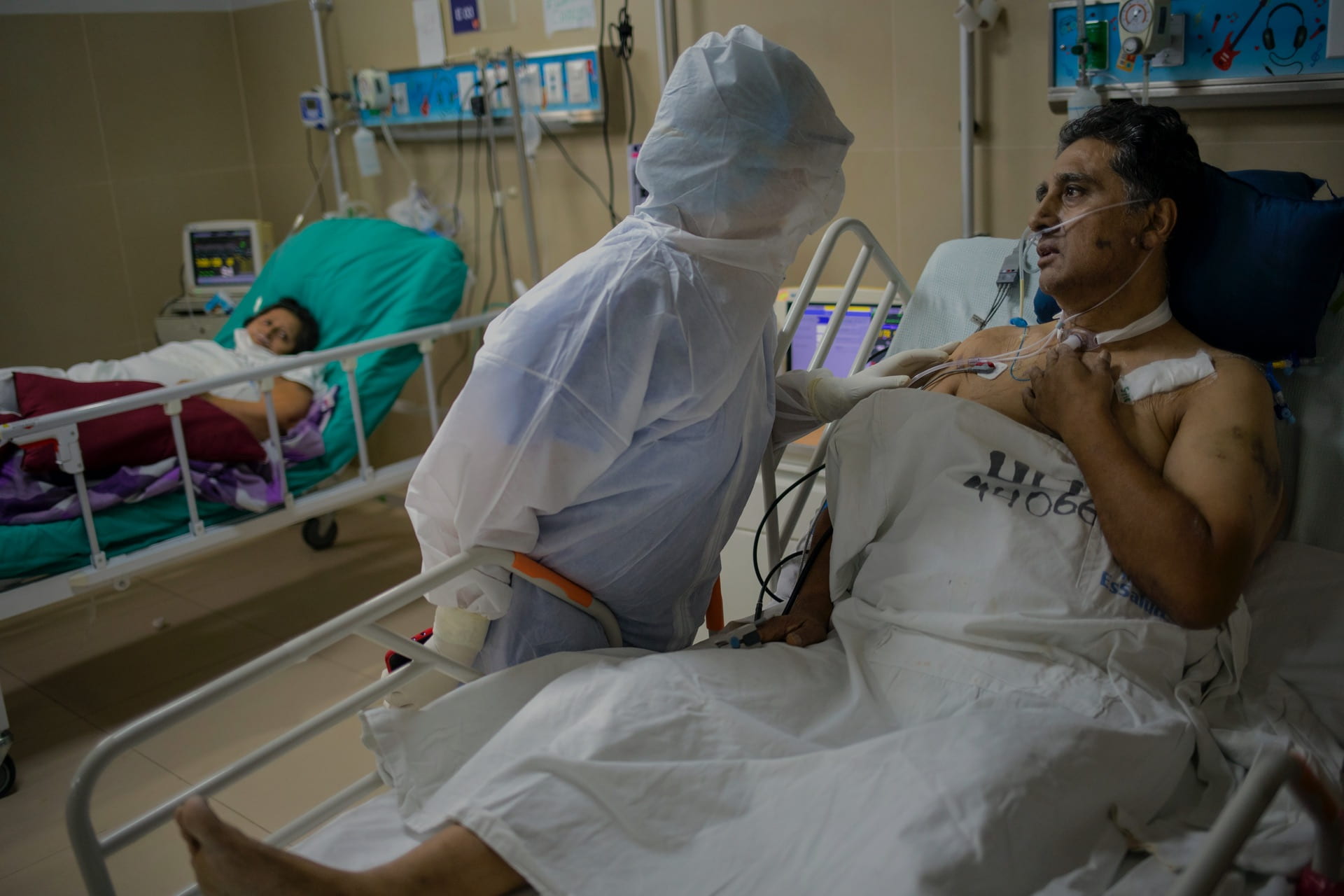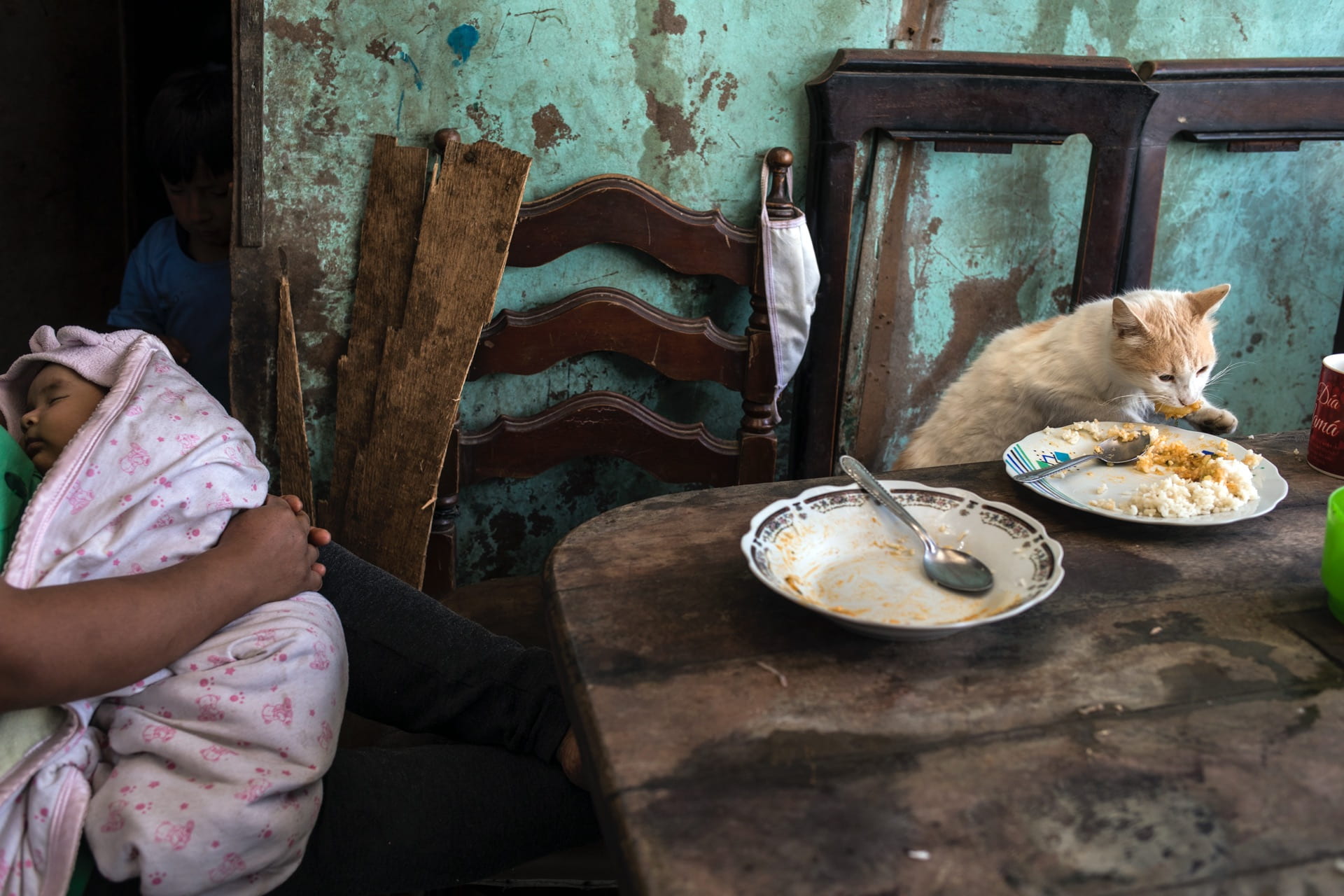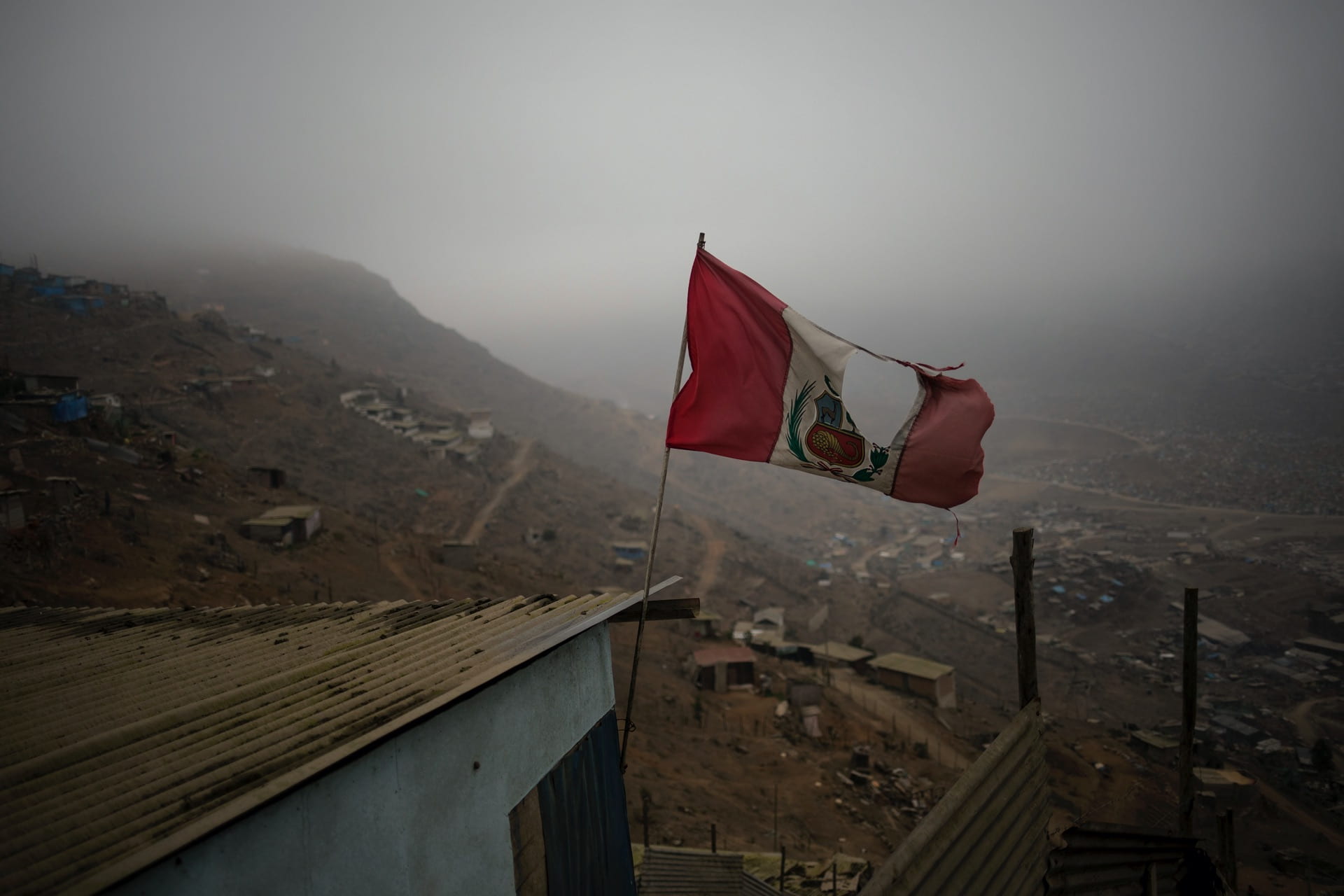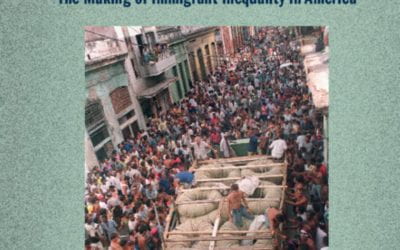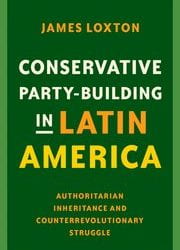Reflecting on the Work of Rodrigo Abd
Photos by Rodrigo Abd
Rodrigo Abd is the first-place winner of the photo contest “Documenting the Impact of Covid-19 through Photography: Collective Isolation in Latin America,” sponsored by ReVista and the Art, Culture, and Film program at Harvard’s David Rockefeller Center for Latin American Studies (DRCLAS.)
The resulting exhibition, based on an Open Call for Photography launched in July 2020, aims to create a critical visual record of our unprecedented times so they can be remembered by future generations. 2020 will be remembered as a watershed year in which a pandemic laid bare the inequalities and fissures within our society. It has also underscored the importance of living and participating in communities even while experiencing the pandemic in isolation. The exhibition seeks to promote a regional perspective from Latin America and the Caribbean of the collective isolation imposed by Covid-19.
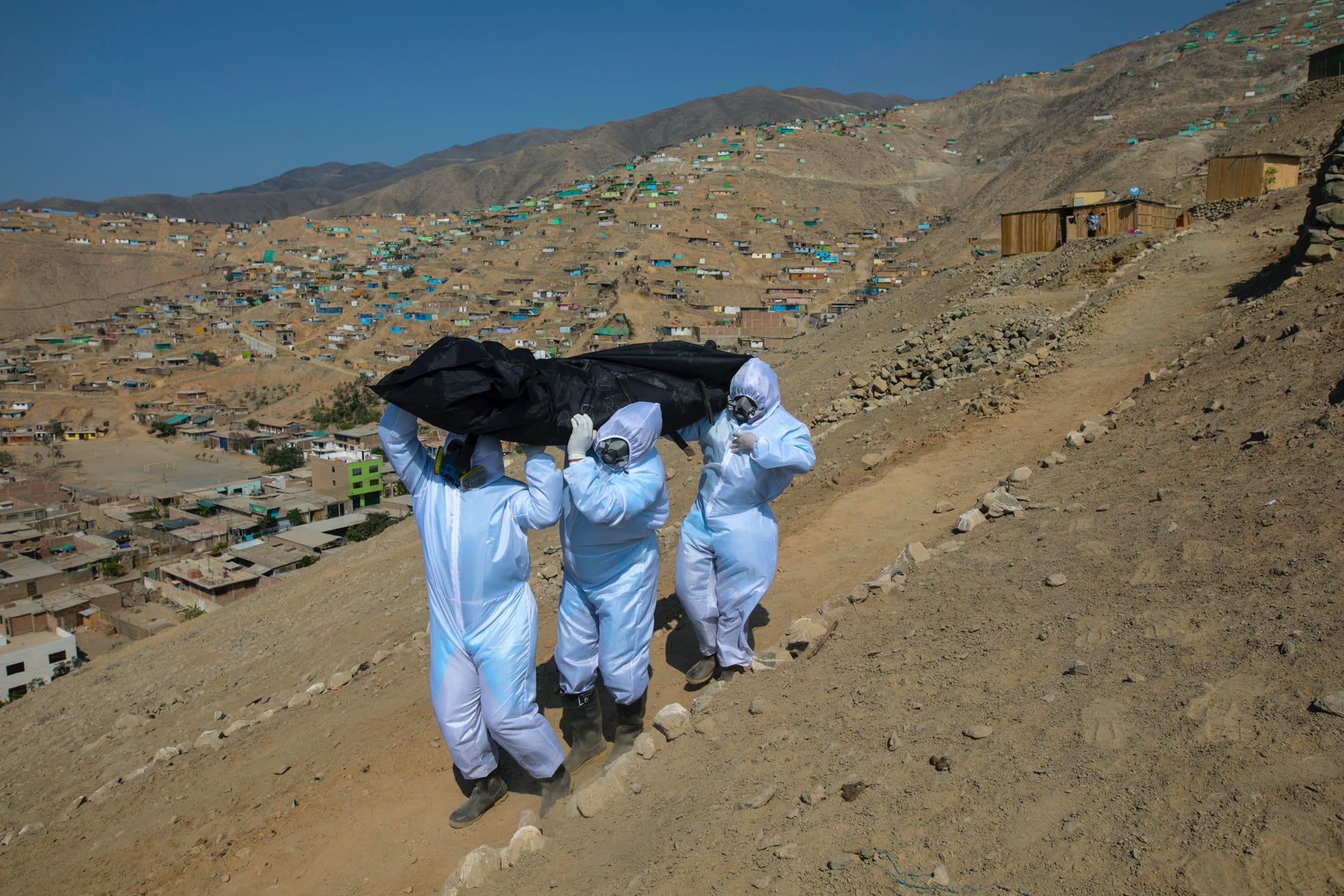
In this May 8, 2020 photo, Piedrangel funeral home workers Luis Zerpa, Luis Brito, center, and Jhoan Faneite, right, from Venezuela, carry the corpse to the hearse of Marcos Espinoza, 51, who died due to Coronavirus in Pachacamac, outskirts from Lima, Peru. Marcos, single and childless, was a humble electrician, who had changed his trade less than a decade ago after working 25 years as a private security guard. Oscar Espinoza, 50, and Marcos’ only brother, said that hours before he died Marcos lamented that the plague had reached him. “Why did this plague get me, if I didn’t hurt anyone,” heard Oscar, who slept in the next room. From the series “The Virus Strips Peru.”
Peru’s capital is a notoriously gray, solemn city. Limeños can go weeks without seeing the sun, catching just a pale glimpse of its radiance behind the clouds. As the coronavirus pandemic wreaks havoc here, Lima’s overcast disposition seems to match the moment: Devastating, trying, with brief moments of sunlight in between.
Associated Press photographer Rodrigo Abd has spent the last eight months capturing the quiet moments amidst the wreckage of Covid-19. The widow who cries out for her husband as she gives birth to their first and only child. The migrant mortuary workers doing the work no one else will sign up for – picking up the bodies of those who die at home. The family that manages to crack a smile at a fond memory of their loved one as they solemnly gather to bury a simple wooden casket in Peru’s vast desert terrain.
- Noly Suarez, 53, holds a cross during the burial of his brother Flavio Ju·rez, 50, who die due to COVID-19, in the Nueva Esperanza cemetery, outskirts from Lima, Peru, Tuesday, May 26, 2020. From the series “The Virus Strips Peru.”
- Doctor Rosa López, comforts his colleague Víctor Cuba, an emergency nurse infected with Covid-19 who recovers at the Guillermo Almenara hospital in Lima, Peru, Friday, May 22, 2020. Despite strict measures to control the virus, this South American nation of 32 million has become one of the countries worst hit by the disease. From the series “The Virus Strips Peru.”
- Day laborers and informal workers who usually eke a living in Peru’s capital evade a police blockade on the outskirts of Lima, Peru, Saturday, April 18, 2020. Because the strict quarantine rules amid the new coronavirus pandemic do not allow for inter-province travel, the workers have been living on the side of the road for three days. From the series “The Virus Strips Peru.”
To bear witness is our fundamental role as journalists – but it takes a special degree of patience, empathy and intuition to be allowed where Abd has gone. COVID-19 is a lonely disease. Those who are infected die alone. And for the most part, their relatives grieve alone, too. Abd has shown us what that sadness looks like.
The Argentine-born photographer who won a Pulitzer Prize with four other AP journalists for their coverage of the Syrian civil war in 2013 has been fearless in documenting Covid-19 – navigating his way into hospitals, crematories, and remote parts of Peru’s Amazon jungle where even some doctors have refused to go.
One day when we look back at this pandemic, Abd’s photographs will tell the story of one of the worst outbreaks anywhere in the world. Peru has the highest per-capita Covid-19 mortality rate by ample measure – though the nation’s tragic tale is rarely front page news in most places. Abd’s work is a testament to those many lives that would otherwise go unnoticed. His work forces us to pay attention.
- In this June 8, 2020 photo, Consuelo Pascacio, 37, embraces her baby while her cat Demon eats leftover food from lunch in Nueva Esperanza neighborhood in Lima, Peru. The female baby was born on March 31 during the pandemic at the María Auxiliadora hospital and has no official name because her mother Consuelo Pascacio has not been able to enroll her in public records because the records are closed at this time. At home they call her Anyelina. From the series “The Virus Strips Peru.”
- In this June 9, 2020 photo, a damaged Peruvian flag flies on the roof of a house in Nueva Esperanza neighborhood in Lima, Peru. From the series “The Virus Strips Peru.”
- Carlos Archbishop of Lima, Carlos Castillo, smokes incense to the portraits of people who died due to the COVID-19, during the Corpus Christi mass in Lima’s Cathedral, Peru, Sunday, June 14, 2020. Sunday’s mass in Lima’s cathedral with the presence of more than 4,000 portraits of the dead from COVID-19 is the first with these characteristics in the South American country where until Saturday more than 6,400 had died and more than 225,000 were infected. From the series “The Virus Strips Peru.”
Reflexionando sobre la obra de Rodrigo Abd
Por Christine Armario
Fotos de Rodrigo Abd
Rodrigo Abd es el ganador del concurso “Documentando el impacto de Covid-19 a través de la fotografía: Aislamiento colectivo en Latinoamérica”, auspiciado por ReVista y el Art, Culture, and Film program del David Rockefeller Center for Latin American Studies (DRCLAS) de Harvard.
La exposición, resultado de el concurso de fotografía anunciado en Julio 2020, busca crear un registro visual de estos tiempos sin precedentes y contribuir a nuestra futura memoria histórica. 2020 será recordado como una año decisivo en el que una pandemia dejó al descubierto las desigualdades y fisuras dentro de nuestra sociedad y la relevancia de vivir y participar de la vida en comunidad incluso mientras se vive la pandemia de forma aislada. La muestra procura promover una perspectiva regional del aislamiento colectivo impuesto por el Covid-19 desde América Latina y el Caribe.
En esta foto del 8 de mayo de 2020, los trabajadores de la funeraria Piedrangel, Luis Zerpa, Luis Brito, centro, y Jhoan Faneite, derecha, de Venezuela, llevan el cadáver al coche fúnebre de Marcos Espinoza, de 51 años, quien murió por coronavirus en Pachacamac, afueras de Lima, Perú. Marcos, soltero y sin hijos, era un humilde electricista, que había cambiado de oficio hace menos de una década después de trabajar 25 años como guardia de seguridad privada. Oscar Espinoza, de 50 años, y único hermano de Marcos, dijo que horas antes de morir, Marcos lamentó que la peste lo hubiera alcanzado. “¿Por qué me afectó esta plaga, si no lastimé a nadie?”, Escuchó Oscar, que dormía en la habitación contigua. De la serie “The Virus Strips Peru”.
La capital de Perú es una ciudad solemne y notoriamente gris. Los limeños pueden pasar semanas sin ver el sol, captando solo un pálido destello de su resplandor detrás de las nubes. A medida que la pandemia de coronavirus causa estragos aquí, la disposición nublada de Lima parece coincidir con el momento: devastador, difícil, con breves momentos de luz solar en el medio.
El fotógrafo de Associated Press Rodrigo Abd ha pasado los últimos ocho meses capturando los silenciosos momentos en medio de los restos del COVID-19. La viuda que llora por su marido cuando da a luz a su primer y único hijo. Los trabajadores migratorios del depósito de cadáveres que realizan el trabajo para el que nadie más se inscribiría: recoger los cuerpos de los que mueren en casa. La familia que logra esbozar una sonrisa ante el grato recuerdo de su ser querido mientras se reúnen solemnemente para enterrar un simple ataúd de madera en el vasto terreno desértico de Perú.
Ser testigos es nuestro papel fundamental como periodistas, pero se necesita un grado especial de paciencia, empatía e intuición para ser bienvenido donde ha ido Abd. COVID-19 es una enfermedad solitaria. Los infectados mueren solos. Y en su mayor parte, sus familiares también sufren solos. Abd nos ha mostrado cómo es esa tristeza.
El fotógrafo de origen argentino que ganó un premio Pulitzer con otros cuatro periodistas de AP por su cobertura de la guerra civil siria en 2013 ha sido intrépido al documentar el COVID-19, navegando en hospitales, crematorios y partes remotas de la selva amazónica de Perú donde incluso algunos médicos se han negado a ir.
Un día, cuando miremos hacia atrás a esta pandemia, las fotografías de Abd contarán la historia de uno de los peores brotes en cualquier parte del mundo. Perú tiene la tasa de mortalidad por COVID-19 per cápita más alta en gran medida, aunque la trágica historia de la nación rara vez es noticia de primera plana en la mayoría de los lugares. El trabajo de Abd es un testimonio de muchas vidas que de otro modo pasarían desapercibidas. Su trabajo nos obliga a prestar atención.
Christine Armario is News Editor for Andes and the Caribbean based in Bogotá, Colombia. She covers the Andes and documents breaking news and longer-form features in words, photos and video. She previously was a journalist in the AP’s Los Angeles, Miami and Tampa bureaus. She is a graduate of the Columbia University Graduate School of Journalism.
Christine Armario es una periodista del Associated Press, basada en Bogotá, Colombia. Cubre los Andes y documenta noticias de última hora y notas de formato extendido a través de artículos, fotografías y videos. Anteriormente fue periodista en las oficinas de Los Angeles, Miami y Tampa del AP. Es egresada de Columbia University Graduate School of Journalism.
Related Articles
A Review of Cuban Privilege: the Making of Immigrant Inequality in America by Susan Eckstein
If anyone had any doubts that Cubans were treated exceptionally well by the United States immigration and welfare authorities, relative to other immigrant groups and even relative to …
A Review of Conservative Party-Building in Latin America: Authoritarian Inheritance and Counterrevolutionary Struggle
James Loxton’s Conservative Party-Building in Latin America: Authoritarian Inheritance and Counterrevolutionary Struggle makes very important, original contributions to the study of…
Endnote – Eyes on COVID-19
Endnote A Continuing SagaIt’s not over yet. Covid (we’ll drop the -19 going forward) is still causing deaths and serious illness in Latin America and the Caribbean, as elsewhere. One out of every four Covid deaths in the world has taken place in Latin America,...


